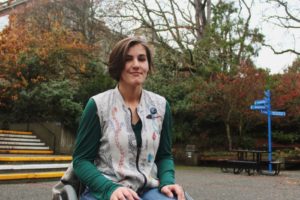Camosun students who were formerly youth in care are benefiting from BC’s Provincial Tuition Waiver Program. The program is for those who lived more than two years as youth in care. The government started the program as a way to give these youth a chance at an education where there might not have been a chance before by covering tuition and mandatory student fees for eligible programs or courses.
Camosun vice president of student experience Heather Cummings is proud to be part of the program.
“I think that the former youth in care program is really consistent with Camosun values—we are an access institution,” says Cummings. “We’ve got incredibly flexible programming and many pathways. It’s not just a financial barrier that needs to be addressed; it’s often helping students build up for academic preparation, and we offer programs that can do that.”
Savannah Barratt and Tianni Arsenault are two first-year students in the program; both have come through more than their fair share of adversity.

“I was in care from when I was 14,” says Barratt. “I had struggled with severe mental-health issues and I couldn’t live at home. I became a ward of the province while I was institutionalized, and then went into a group home.”
Barratt spent her teen years in the group home, and with the help of various supports she was able to graduate from high school as a young adult. It was in high school that she heard about the program.
“The plan was to start post-secondary in September,” says Barratt. “Camosun felt like a natural choice because of the flexibility and its less big, scary nature. Someone I knew told me about the tuition waiver and that I might qualify.”
Arsenault was seven when she and her two brothers went into care.
“I lived with my birth parents until then,” says Arsenault. “There was a lot of abuse and neglect that happened. My older brother, my younger brother, and I, we almost didn’t make it out of that situation. It was a very rough time.”
Arsenault has since won a scholarship; she plays sports to stay focused.
“Honestly, I am using Camosun to keep up with my schedule and keep me doing something,” says Arsenault. “I get very antsy not doing anything. I ended up going to Camosun right after I graduated.”
Barratt believes that this program might help to close the door on the past.
“After you’ve had a very painful—or in my case, very difficult and unimaginable—youth, with the government being a big part of it,” she says, “it’s kind of nice for them to gift you back opportunity versus, in some ways, kind of limiting you and taking things away.”
Barratt says that once she got out of care, moved out, graduated, and started college, she was then taking on new, more positive, challenges.
“I started all the things that I couldn’t do for so long,” she says, “and they’re all good, and varied, and curious, and new.”
Camosun College Student Society external executive Fillette Umulisa believes that the tuition-waiver program is an important step toward social inclusion.
“We strongly support the tuition-waiver program for former youth in care,” says Umulisa. “We feel like in this day and age, many parents help and encourage their children to get a post-secondary education. But those who do not have parents, who have grown up in the system and have now outgrown the system, well, they should have that same chance. We also know that youth in care face many barriers, and we are so happy that the post-secondary institution is not one of those barriers anymore.”
